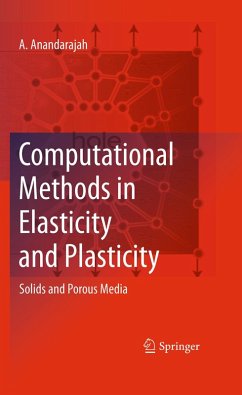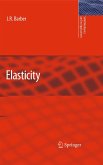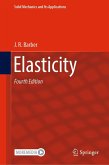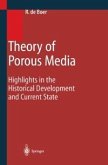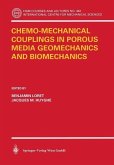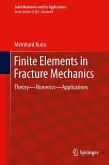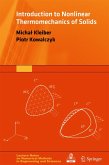Computational Methods in Elasticity and Plasticity: Solids and Porous Media presents the latest developments in the area of elastic and elasto-plastic finite element modeling of solids, porous media and pressure-dependent materials and structures. The book covers the following topics in depth: the mathematical foundations of solid mechanics, the finite element method for solids and porous media, the theory of plasticity and the finite element implementation of elasto-plastic constitutive models. The book also includes:
-A detailed coverage of elasticity for isotropic and anisotropic solids.
-A detailed treatment of nonlinear iterative methods that could be used for nonlinear elastic and elasto-plastic analyses.
-A detailed treatment of a kinematic hardening von Mises model that could be used to simulate cyclic behavior of solids.
-Discussion of recent advances in the analysis of porous media and pressure-dependent materials in more detail than other books currently available.
Computational Methods in Elasticity and Plasticity: Solids and Porous Media also contains problem sets, worked examples and a solutions manual for instructors.
-A detailed coverage of elasticity for isotropic and anisotropic solids.
-A detailed treatment of nonlinear iterative methods that could be used for nonlinear elastic and elasto-plastic analyses.
-A detailed treatment of a kinematic hardening von Mises model that could be used to simulate cyclic behavior of solids.
-Discussion of recent advances in the analysis of porous media and pressure-dependent materials in more detail than other books currently available.
Computational Methods in Elasticity and Plasticity: Solids and Porous Media also contains problem sets, worked examples and a solutions manual for instructors.
Dieser Download kann aus rechtlichen Gründen nur mit Rechnungsadresse in A, B, BG, CY, CZ, D, DK, EW, E, FIN, F, GR, HR, H, IRL, I, LT, L, LR, M, NL, PL, P, R, S, SLO, SK ausgeliefert werden.
From the reviews:
"The text is mostly self-contained and provides a well-detailed presentation of all topics needed, including a fair amount of discussed examples creating excellent opportunities for interested research students to expand and test their own results. The presentation of every topic is update and deep enough to meet anyone working on the title problems. ... the students of different techniques (e.g., boundary element practitioners) should also profit from this remarkable textbook. Especially, research engineering students interested in stress analysis should profit immensely from this noteworthy contribution." (J. C. F. Telles, Zentralblatt MATH, Vol. 1211, 2011)
"The text is mostly self-contained and provides a well-detailed presentation of all topics needed, including a fair amount of discussed examples creating excellent opportunities for interested research students to expand and test their own results. The presentation of every topic is update and deep enough to meet anyone working on the title problems. ... the students of different techniques (e.g., boundary element practitioners) should also profit from this remarkable textbook. Especially, research engineering students interested in stress analysis should profit immensely from this noteworthy contribution." (J. C. F. Telles, Zentralblatt MATH, Vol. 1211, 2011)
"This book was written to serve as a textbook for graduate students in the area of computational methods in elasticity and plasticity. However, the subject matter is presented in such a manner that makes it equally suitable for advanced-level undergraduate students. ... The reviewer found this book interesting to read and believes that the author has done an excellent job in presenting the material in a lucid and easy-to-follow manner for its audience." (V. K. Arya, Mathematical Reviews, June, 2015)
"The text is mostly self-contained and provides a well-detailed presentation of all topics needed, including a fair amount of discussed examples creating excellent opportunities for interested research students to expand and test their own results. The presentation of every topic is update and deep enough to meet anyone working on the title problems. ... the students of different techniques (e.g., boundary element practitioners) should also profit from this remarkable textbook. Especially, research engineering students interested in stress analysis should profit immensely from this noteworthy contribution." (J. C. F. Telles, Zentralblatt MATH, Vol. 1211, 2011)
"The text is mostly self-contained and provides a well-detailed presentation of all topics needed, including a fair amount of discussed examples creating excellent opportunities for interested research students to expand and test their own results. The presentation of every topic is update and deep enough to meet anyone working on the title problems. ... the students of different techniques (e.g., boundary element practitioners) should also profit from this remarkable textbook. Especially, research engineering students interested in stress analysis should profit immensely from this noteworthy contribution." (J. C. F. Telles, Zentralblatt MATH, Vol. 1211, 2011)

